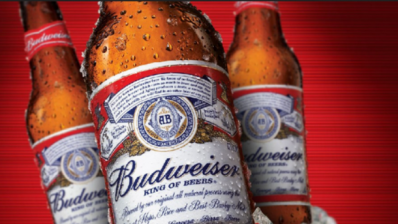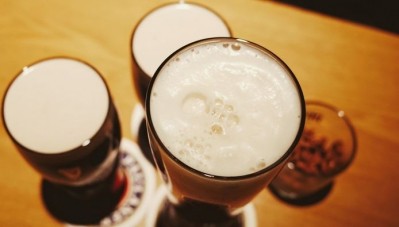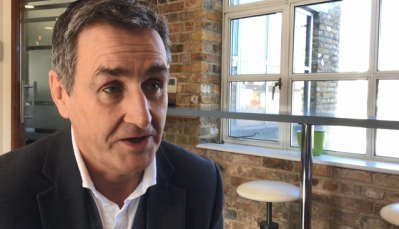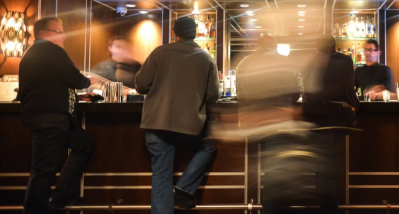Molson Coors boss: Future of on-trade 'brighter than ever'
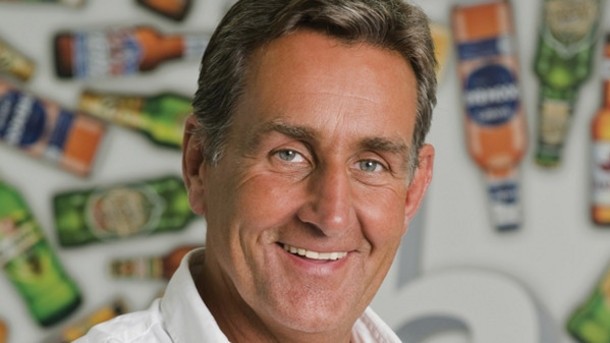
Many pub trade veterans are guilty of looking at the sector’s past with rose-tinted spectacles, and while Martyn Cozens draws on fond memories from his three decades of working in beer and pubs with a smile on his face, he makes it clear there remains plenty more glory for pubs well into the future.
Cozens has to be an optimist, though. His role recently merged with another to create the position of on-trade sales director for the UK and Ireland, making him one of Molson Coors’ busiest bosses. Prior to this change, he was the head of sales for the independent on-trade, while a counterpart looked after the likes of the pubcos.
It appears the sales boss is embracing his new job as an opportunity to make a difference in the trade where he’s spent the majority of his adult working life. Whereas some faced with such a glut of responsibility might crumble, Cozens seems confident he will succeed, obvious in the way he rolls off opportunity after opportunity he believes are available to pubs.
Having worked in beer and pubs for 31 years this August, change is something Cozens is very familiar with. “There have been a lot of changes in my time,” he recalls.
“When I joined what was the Bass business, there were four or five major brewers, all owning lots of pubs – I think we owned 8,000 when I joined – and we had the Beer Orders for those.” The demise of the brewing giants’ hold on pubs was the first of several major industry-changing developments Cozens has seen during his career.
“I also worked through the big social and economic changes that have taken place in the UK over the years, in terms of the demise of heavy industry and the growth of in-home entertainment,” he adds.
“We’ve seen that impact on the beer business, including the shift from the on-trade to the off-trade. As a result of that, and other factors, the fight for the leisure pound has increasingly been a challenge for the on-trade.”
Looking at the positives
But this man does not like to dwell on the negatives, as a matter of fact, any question with the slightest breath of gloom is negated by Cozens, who quickly points out the opportunity and potential behind whatever cynical question might have been proposed.
To prove the point he does not dwell on the ‘better years’. Cozens says that, while the UK has lost a considerable amount of operations, the state of the on-trade is brighter than ever.
“The sector is stronger in the sense that the on-trade environment is better and is increasingly getting better than it was 25 to 30 years ago. People clearly have to work harder than they ever did and have to invest more of their time and resources into their business if they are to get to the retail standards where customers will come back [to the pub],” he says.
One beacon of hope and opportunity Cozens believes pubs can tap into is Molson Coors’ latest campaign – Putting the ‘Great’ back into Great British Pubs and Clubs – which has been designed to give the on-trade practical first-hand support to grow their businesses. The campaign, launched in March this year, is a direct attack on the UK’s ‘one-size-fits-all’ coffee shop culture.
Pubs have to fight harder than ever to tap into the leisure spend, as a result of more choice from the new and growing casual-dining chains, Cozens says.
“Pubs have a very important part to play in UK society, particularly community pubs,” he explains. “We have a responsibility as a major brewer to do all we can to support those licensees to make their businesses more successful, to get more people through the door, to keep them longer and give them a great experience.
“I wouldn’t want to suggest we can save the great British pub, but we can support it, celebrate and champion it and I’m clearly invested to do that.”
Supporting the trade
Support offered by the initiative includes help with staging events; advice on maximising live sporting events revenue; on-site staff training; social-media advice; and sampling and tasting kits.
There is no hard figure on the amount of investment Molson Coors is prepared to pump into its customers’ businesses either, the sales boss reveals. Instead, account managers have been “empowered” to assess the needs of the licensees and dedicate funding accordingly.
Although Molson Coors is prepared to invest in the businesses it sells to, the company’s focus is primarily on drinks sales, particularly beer, so it is interesting to hear Cozens’ current view on
the segment.
“There’s been a huge explosion of craft beer, which I think has been very positive for the industry and it’s had a halo effect on beer overall. There’s been a resurgence and interest in beer as a result,” he says.
“Choice is good but people still often look for what they would recognise in terms of big supported brands and they have a big and important role to play. That’s complemented by what we would call more niche and premium and crafted brands.”
A dramatic rise in choice will inevitably see the craft market consolidate a little at some point in the future, Cozens maintains.
And of the big names, such as Molson Coors’ newly rebranded Carling, the boss believes they will always have a big space on the bar and in the wider drinks industry. Cozens is so confident in the future of the mainstream lager category that he reveals work is being carried out on the redesign of Coors Light, but refuses to go into detail.
He explains: “When we refresh a brand, we see an uptick in the rate of sales, as consumers are drawn to something that’s fresh and exciting and that’s important to retailers that they’ve got brands that are recognisable and that consumers want.”
It is too difficult to put a figure on the average sales increase of brands following a refresh, but Cozens says it is usually worth the time and investment.
Coors Light, while in the process of a refresh, has been performing well since its UK launch earlier this century. This compares with AB InBev’s first launch of Bud Light in the ’90s, which didn’t last long and left the UK before coming back earlier this year.
“We launched Coors Light in the UK in 2003 and it’s always grown since then, but in the past four years we have seen exponential growth and I think it’s because consumers really get it,” says Cozens.
“I couldn’t comment on Bud Light be-cause that’s for ABI, but for Coors Light it’s been about patience and continual investment, which sparked interest.
“Initially, it is quite hard to launch a brand, but you have to stick at it. It’s all about persistence. Sales have grown by 30% over the past few years, but we weren’t growing at that when we launched.”
Wide-ranging portfolio
Yet, the mammoth brands are not Molson Coors’ only focus, with the brewer’s portfolio featuring smaller names such as Sharp’s and also the fairly recent launch of its ‘craft’ beer and cider concept Brew + Press, which was developed to help operators deliver a range of more premium and crafted brands to their customers.
Brew + Press is currently only available to London operators, however, there are plans to broaden its reach to other cities and deliver the range to the likes of Leeds, Manchester and Birmingham as soon as possible.
True to form, Cozens’ outlook on the future of the segment is as positive as he sees it now. He believes operators can expect a bright few years ahead and says: “I think we’re starting to see some stability in the marketplace in terms of pubs not shutting up as frequently as they were and we’re seeing retail standards improve as pubs understand they’re going to have to do more to keep customers coming in and spending their money in the pub.”
It is important not to focus on the number of pubs left, but on the quality of the offer provided by those remaining, he adds. While he is not so bold as to say whether we will ever see growth in the number of pubs, Cozens does perhaps don his rose-tinted spectacles when he points to the improved experience and choice on offer by pubs these days when compared with the past.
